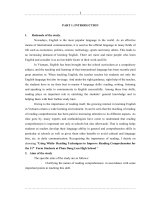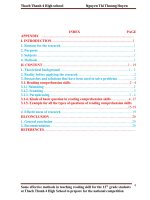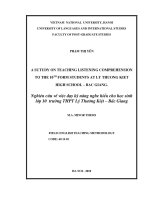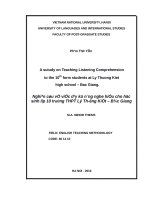Using mind mapping as a tool to systematically revise english grammar for the 12th form students in cam ba thuoc high school
Bạn đang xem bản rút gọn của tài liệu. Xem và tải ngay bản đầy đủ của tài liệu tại đây (2.65 MB, 17 trang )
PART A: INTRODUCTION
1. The rationale of the study
English grammar, as one of the English components, is very important in
learning a language. When the students master the English structure well, they will
be able to construct correct sentences and to communicate effectively. Moreover,
without adequate grammar knowledge, learners’ language development will be
severely constrained.
Even though grammar is a fundamental material that must be mastered by
the students, in fact, there are many students who do not like learning grammar.
Grammar often triggers a negative reaction in both teachers and students (Dykes,
2007). Morever, Decapua (2008) states that the term grammar often brings our
mind into unpleasant memories. Meanwhile, many students face difficulties to
understand and apply the English grammar. Realizing the obstacles of learning
grammar, many reseachers proposed ways to teach English grammar to the
students. Commonly, the use of media or the use of certain techniques is used by
practitioners as variation of teaching to help students’ learning.
Mind map, which is a tool to express divergent thinking, can help people
rationally utilize man’s left and right brain to improve people’s creativity and
memory. Mind map has been used in a variety of language teaching as a visual
media that allows the students to brainstorm, arrange, memorize new information
and helps the students stimulate their logic of thinking practices (Yen, 2010). Mind
map, decorated with colors, pictures, code, multi- dimension, can lessen the
vacuity of traditional grammar teaching and arouse the enthusiasm of students.
Moreover, it can help students to remember and understand grammar, be more
convenient to extract the information of grammar, improve the efficiency of
grammar learning.
For the 12th form students, the final year will be the most challenging for
them because of the pressure to pass the entrance examination. This is also the time
for the students to revise the knowledge systematically. Learning by heart is not the
best way for them to memorize all the knowledge and they seem to be up to the
ears with many things to cover.
From the above reasons, I choose the topic “Using Mind-mapping as a tool
to systematically revise English grammar for the 12th form students in Cam Ba
1
Thuoc high school”, hopefully that it will help enhance students’ initiative,
promote their interest in learning, the efficiency of learning and the ability of
grasping grammar knowledge.
2. Aims and Objectives of the study
With the reasons above in my mind, the specific aims of the study
accordingly are:
+ To demonstrate the benefits that Mind map can bring to the students’ language
learning.
+ To give out grammatical system of English language for students in the
preparation for the entrance examination with the use of Mind maps.
3. Objects of the study
In this study, I intend to help the low-level students revise what they have
learnt by using mind mapping technique so that they can memorize the knowledge
easily.
4. Methods of the study
With reference to its characteristics, this study can be categorized as an
action research. The following instruments are applied to collect data for this
study:
* A study on theoretical background of Mind map and its benefits in grammar
acquisition.
* Personal observations by attending classes.
5. Remarkable points of the study
The study tends to help promote students’ interest in learning English
grammar. Also, it will help them to recognize and remember the grammatical items
more effectively.
2
PART B: DEVELOPMENT
I. Theoretical background of Mind map grammar learning and teaching.
I.1. Definitions of Mind map in learning and teaching
Mind map is the expression of divergent thinking, so it is also the natural
function of human thinking. This is a very useful graphic technique and a universal
key to unlock the brain’s potential. A Mind map is a diagram which is used to
visually organize information. It is often created around a single concept, drawn as
an image in the center of a blank page, related to representations of ideas such as
images, words and parts of words are added (Buzan, 1993).
I.2. The importance of Mind- mapping technique in language learning and
teaching
Mind map is always decoreated with colors, pictures, symbols and so on.
With the aid of its features, teachers use Mind map to lecture lessons to make the
lessons fun, to stimulate the students’ interest in learning. While easily accepting
the Mind map, the students learn much more grammar. The Mind map follows the
features of the divergent thinking of the human’s brain. It makes the students
effectively input or output messages which are linked with some words. On the
other hand, using this way to memorize or distill information can cultivate
students’ creativity and excavate their potential. Using Mind map to make notesonly rememering the relevant words can help students save a lot of time by looking
at related words and create a clear and more appropriate association between key
words.
Introducing Mind map into teaching effectively, by combining the two
different Mind maps of main tree maps and contrast diagrams, helps students to
intergrate some fragmentary knowledge points with those resources and help them
to study systematically. At the same time, students can also form good habits of
thinking and study in order to improve their learning efficiency. It’s helpful for
students to use Mind map to complete the integration of grammar knowledge. The
method of drawing Mind map can not only stimulate students’ interest in learning,
3
but also guide them to develop a habit of thinking actively and improve their
understanding of knowledge content.
II. The reality of teaching grammar in every high school.
In the course of a traditional high school English grammar class, teachers
always play as the main speaker explaining the grammatical rules of the English
language, organizing teaching in his/ her native language. What students need to do
is just listening and trying hard to memorize the grammatical rule and examples. It
is too passive of students in this kind of teacher-centered class. Teachers occupy
dominant role to lecture the contents in the text. We can’t fail to notice that the
students are told to keep grammar knowledge in mind by practicing for a thousand
times. Students are deprived of enthusiasm and passion in the class. Therefore, it’s
not difficult to understand that why English grammar is very dull and boring.
Located in a mountainous area, Cam Ba Thuoc high school, where I am
taking a duty for two years of teaching, consists of more than three hundred 10 th
grade students of low English level. Getting to know the English language,
especially grammar is not easy for them. With the traditional way of teaching
grammar, they tend to recognize and understand the grammatical items passively.
Moreover, the difficulties in remembering and revising grammar are what they are
facing. As a teacher in Le Loi high school, in the time of taking a duty here, I
desire to apply a different and creative way in helping the 12 th form students to
grasp and revise all the grammatical items effectively, hopefully that they will
make more progress in acquiring the English knowledge.
To find out the reality and the effectiveness of some traditional methods in
teaching grammar to the students, I carried out two pre-tests among 65 students
from 12B2 and 12C2. The results shown in the table below:
4
PRE-TEST
giỏi
khá
trung bình
yếu
kém
8.96%
17.91%
1.49%
32.84%
38.81%
15-minute test no1
giỏi
khá
trung bình
yếu
kém
8.96%
17.91%
1.49%
32.84%
38.81%
45- minute test no1
The results of the test show that the students are at a low level to understand
the grammar and apply the grammatical knowledge to their doing exercises. Some
even can’t make sense of anything in grammar. That confused me a lot and I was
wondering how to help my students to make progress.
III. Different types of mind-mapping technique in teaching grammar.
Mind maps are one of the easiest, most common ways of visualizing data.
They are used often as a thought development process, especially in education
settings, as you can create ‘branches’ from one central idea in order to explore
5
different related ideas. But when it comes to create a visually engaging, well
designed mind map it can be more difficult to know which kind of mind map is
most effective. Belows are some typical types of mind maps widely used in
language teaching.
Flow Map
Multi-flow map
Brace map
6
Tree map
Circle map
Bubble map
Double bubble map
In teaching grammar, teachers can variously use different types of mind
maps according to its content or its aims. It is advisable that grammar should be
taught in some main parts of grammatical items such as: tense, passive voice,
reported speech….so that the students can have easier revision of what they have
learnt.
7
Articles
Word classes
IV. Steps to create a mind map effectively
There are some different ways to create a mind map, depending on the
content or the aim of the lesson. Buzan (2004, 45) proposes six steps of drawing a
mind map to identify it more efficiently and effectively.
8
1. Start in the CENTRE of a blank page turned sideways. Starting in the centre
gives your brain freedom to spread out in all directions and to express itself more
freely and naturally.
2. Use and IMAGE or PICTURE for your central idea. An image is worth a
thousand words and helps you use your imagination. A central image is more
interesting, keeps you focus, helps you concentrate and gives your brain more of a
buzz!
3. Use COLORS throughout. Because colors are as exciting to your brain as
images. Color adds extra vibrancy and life to your mind map, adds tremedous
energy to your creative thinking and is fun.
4. CONNECT your MAIN BRANCHES to the central image and connect your
second and third level branches to the first and second levels. Your brain works by
association. It likes to link two or three or four things together. If you connect the
branches, you will understand and remember a lot more easily.
5. Make your branches CURVED rather than straight lined. Because having
nothing but straight lines is boring to your brain.
6. Use ONE KEY WORD PER LINE. Because single key words give your Mind
map more power and flexibility.
7. Use IMAGES throughout. Because each image is worth a thousand words. So if
you have only 10 images in your Mind map, it’s already the equal of 10,000 words
of notes.
V. The application of the Mind map in English grammar revision to the 12 th
form students.
There are different ways for the students to revise English grammar, some
tend to learn by heart, the others tend to write down as many times as possible until
they can remember all the grammatical structures. In fact, in this way, students
may easily remember the knowledge but forget it sooner or later. As a teacher with
many years of experiences in teaching the 12th form students, I choose the other
way to instruct my students to revise by using Mind map in the main categories of
the grammar such as: tense, passive, reported speech….. so that the students can
acquire and have a careful revision of English grammar systematically.
9
English Tense
Conditional sentences
10
Reported speech
Types of clauses
11
Comparatives and superlatives
Relative clauses
12
Articles
Prepositions
13
VI. Result of the study and some recommendations
After one year trying to apply the using of mindmap in almost every main
topic with a view to helping the students recognize and memorize the grammatical
structure systematically, it’s delighted to see their progress in every test. Here are 2
typical tests at the end of the course:
giỏi
khá
trung bình
yếu
kém
8.96%
17.91%
1.49%
32.84%
38.81%
15-minute test no 6
giỏi
khá
trung bình
yếu
kém
8.96%
17.91% 1.49%
32.84%
38.81%
45- minute test no 2
The results don’t fully come up to my expectations; however, it’s obvious
that my students are slowly and gradually making progress. More importantly, they
can find the interest and keeness when studying English, especially the English
grammar. In their response, their abilities in remembering and understanding the
grammatical items are getting better and they can deal with many different types of
14
exercises. There’s no denial that using Mind map brings many benefits to the
students in trying to mastering English language.
When students use their imagination and creativity to draw a mind map, they
are motivated to learn and to show their interests toward their learning. They can
organize the ideas by their own language; and therefore, they can systematize their
studying in the way that best suits them. Advisably, they should do this drawing at
home, gather all in a portfolio so that they can use many times and keep it in a long
time for repeated use.
15
PART 3- CONCLUSION
The results of the study clearly show that the implementation of this action
research project and its results were fairly effective. Using mind map in helping
students to revise English grammar systematically is undoubtfully benefitable.
Also, their enthusiasm for the ways of learning grammar was also developed
remarkably.
The above technique can be used as strategies for developing their source of
grammatical structures that cultivate students’ interest and help students apply in
the process of language learning. The technique has a positive effect on students
and make them want to learn more. After one- year- practice, the students in my
class had better understanding and the ability in dealing with the grammar.
Signature of Principle
Thanh Hoa, May 18th, 2021
Hereby, I certify that this study is the
result of my own experience and has
not been submitted by any others.
Writer
Lê Thị Thủy
16
REFERENCES
[1] Buzan, T & Buzan, B (1993). The Mind Map Book. London, Penguin Group
[2] Buzan, T (2005).The Ultimate Book of Mind Maps. London, Thorsons
[3] Decapua, A (2008). Grammar for teacher: A guide to Ameracan English for
native and non-native speakers. New York, Springer
[4] Dykes, B (2007). Grammar for everyone. Australia: ACER Press
[5] Yen, A. C (2010). Our language clicked: Shakespeare in EFL classes. Asian
EFL journal, 12 (4), 33-50
17









